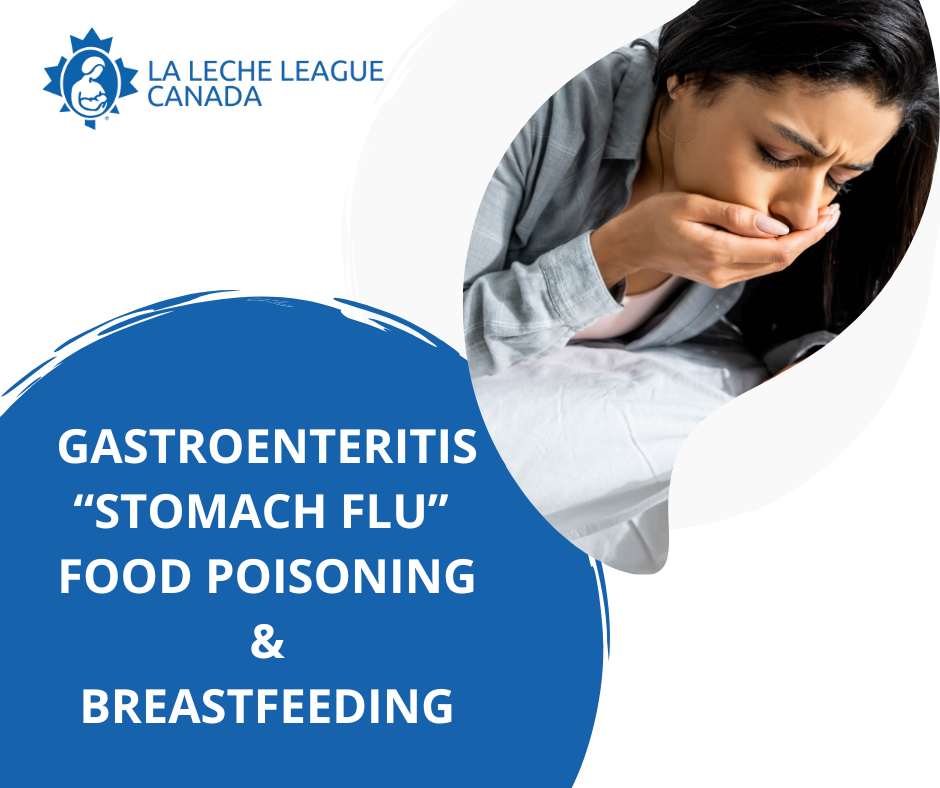
Gastroenteritis is an inflammation of the stomach and intestines. It causes vomiting, nausea and diarrhea. Viral gastroenteritis is contagious and easily transmitted from person to person. It is caused by viruses (for example, Norovirus and Rotavirus). Dehydration is the primary concern, so it’s important that both you and your baby stay well-hydrated.
Food poisoning is caused by eating food contaminated with bacterial toxins (poisons) or other organisms. It is not contagious.
We have long known that breastfed babies are far less likely to be admitted to hospital with viral gastroenteritis infections. It is only recently that we have started to understand why.
Studies have shown that if you contract a “stomach flu” (usually Norovirus or Rotavirus) your body will produce virus-fighters (antibodies) that enter your milk and provide immune protection for your breastfed baby. Breastfeeding protects babies from the viruses that cause gastroenteritis.
If you have gastroenteritis:
If you come down with gastroenteritis continue to nurse your baby. Although you are ill, your milk will provide your baby with protection against the virus. There is no specific treatment for viral gastroenteritis except rest and drinking plenty of fluids. Most people will recover without complications. If you have vomiting or diarrhea:
- Rest at home and do not attend work or go to places where others gather. The incubation period for Norovirus is 12 to 48 hours. Those who are already ill should limit their interactions with others to avoid passing on the virus which is generally active for 24 to 60 hours.
- Do not prepare food for others or care for children or the elderly. Continuing to nurse your baby is the only exception to this rule. These precautions should continue until 48 hours after diarrhea or vomiting ceases.
- Wash hands thoroughly with soap and running water for 20 seconds after using the toilet.
- Drink plenty of clear fluids, for example juice or soft drink diluted 1 part to 4 parts water, to prevent dehydration. Avoid undiluted fruit juice and soft drinks as they may increase dehydration and diarrhea. In cases of severe dehydration, rehydration drinks and salts are available from pharmacies and are compatible with breastfeeding. Intravenous fluids may be needed in severe cases of dehydration.
- Check the labels of over-the-counter antidiarrheal medications to avoid using bismuth subsalicylate compounds. These compounds can lead to the transfer of salicylate to the child via your milk. If you have any questions about what medications are compatible with breastfeeding, consult your healthcare provider or pharmacist.
- Consult with your healthcare provider in the case of severe symptoms.
If your baby has gastroenteritis:
Continue to nurse your baby. Your milk will help with recovery from the illness. It is recommended that infants and children who are vomiting and have diarrhea drink “clear” fluids. Human milk is a clear fluid and is the only thing a baby under the age of six months should drink. Older babies may also receive water and other clear fluids. Frequent breastfeeding will help replace any fluids lost through diarrhea or vomiting. Follow your baby’s lead, nurse as often and for as long your baby wants. Your milk continues to provide your baby with essential nutrients that are easily absorbed even when it seems as if it is all being thrown up or passing quickly to the diaper.
Babies can become dehydrated very easily, especially when they are less than six months of age. Signs of dehydration are:
- abnormal drowsiness,
- lethargy, listlessness, sleeping through feeds
- weak cry
- dry lips and mouth
- fewer tears
- fewer wet diapers (less than two in 24 hours)
- fever
If your baby or child has any of these symptoms, consult your healthcare provider. If intravenous (IV) rehydration in hospital is needed, you can continue to nurse there as much as your baby or child wants.
If you have questions or concerns about breastfeeding your baby through any mother or baby illness, call a La Leche League Canada Leader to talk over your options and strategies.
Please consider supporting LLLC.
References:
Centers for Disease Control & Prevention. (2021, August 10). Food-borne and Waterborne Illness: Should a woman experiencing “traveler’s diarrhea” breastfeed her child while she is ill?
Jiang, Xi., Huang, P., Zhong, W., et al. (2004). Human Milk Contains Elements that Block Binding of Noroviruses to Human Histo-Blood Group Antigens in Saliva. The Journal of Infectious Diseases, 190, 10, 1850–1859.
Mohrbacher, Nancy. (2020). Breastfeeding Answers: A Guide for Helping Families, Second Edition. Nancy Mohrbacher Solutions, Inc.
Plenge-Bönig, A., Soto-Ramírez, N., Karmaus, W., Petersen, G., Davis, S., Forster, J. (2010). Breastfeeding protects against acute gastroenteritis due to rotavirus in infants. European Journal of Pediatrics, 169(12):1471-6.
Updated 2024
